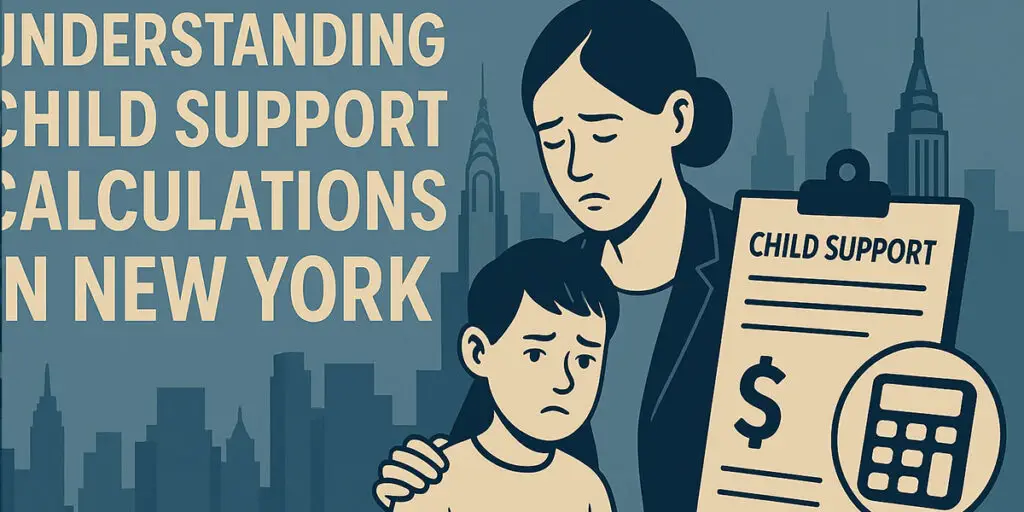Understanding Child Support Calculations in New York: Navigating the Guidelines and Ensuring Your Child’s Well-being
Determining child support obligations can be a complex and often contentious aspect of divorce or separation. In New York, child support is calculated based on a specific formula outlined in the Child Support Standards Act (CSSA). Navigating these legal guidelines requires a clear understanding of how income is calculated, the applicable percentage, and any relevant deviations. At Morgan Legal Group, serving New York City and beyond, we provide experienced and compassionate legal representation to parents navigating child support matters, ensuring their rights are protected and their children’s needs are met. This comprehensive guide will explore the key aspects of child support calculations in New York, providing valuable insights into the CSSA, income determination, deviations, and how to work with an attorney to achieve a fair and equitable outcome. Understanding these processes and what they do will help you feel protected and secure.
The Child Support Standards Act (CSSA): The Foundation of Child Support Calculations in New York
The Child Support Standards Act (CSSA) is the foundation of child support calculations in New York. The CSSA provides a formula for determining the basic child support obligation based on the parents’ combined income and the number of children. It aims to ensure that children receive adequate financial support from both parents. CSSA calculations are based on a specific formula. These help you plan for the best child support option.
While the CSSA provides a guideline for calculating child support, courts have the discretion to deviate from the guidelines in certain circumstances. This law is designed to ensure a stable environment for the child. In many situations, though, this guideline is helpful and serves as the end all be all.
Determining Parental Income: A Key Component of the CSSA Formula
The first step in calculating child support under the CSSA is to determine each parent’s income. The CSSA defines income broadly to include:
- Gross income as reported on your most recent tax return
- Investment income
- Workers’ compensation benefits
- Unemployment insurance benefits
- Social Security benefits
- Veterans’ benefits
- Other sources of income
Certain deductions are allowed from gross income, such as:
- Unreimbursed employee business expenses
- New York City or Yonkers income taxes
- Social Security and Medicare taxes
- Child support paid for other children
Accurate income determination is crucial for calculating the correct child support obligation. It can get very difficult, so reach out to an attorney. This ensures fairness. The income test is the foundation for support calculations.
Applying the CSSA Percentage: Calculating the Basic Child Support Obligation
Once each parent’s income is determined, the next step is to apply the CSSA percentage to the combined parental income. The CSSA percentages are:
- One child: 17%
- Two children: 25%
- Three children: 29%
- Four children: 31%
- Five or more children: No less than 35%
The CSSA percentage is applied to the combined parental income up to a certain threshold, which is adjusted periodically. For combined parental income above the threshold, the court has discretion to apply the CSSA percentage or to deviate from the guidelines. All parties have a chance to speak and express their concerns with a legal member present. These are in place to help keep everything moving.
Add-On Expenses: Healthcare, Childcare, and Education
In addition to the basic child support obligation, the court may also order parents to contribute to certain add-on expenses, such as:
- Healthcare expenses not covered by insurance
- Childcare expenses necessary for the custodial parent to work or attend school
- Educational expenses
These add-on expenses are typically divided between the parents in proportion to their incomes. These additional expenses reflect unique needs. They enhance the child’s well-being.
Deviations from the CSSA Guidelines: When the Court May Adjust the Amount
While the CSSA provides a guideline for calculating child support, courts have the discretion to deviate from the guidelines if the application of the guideline would be unjust or inappropriate.
Factors that may warrant a deviation include:
- The financial resources of the parents
- The physical and emotional health of the child
- The child’s educational needs
- The standard of living the child would have enjoyed if the parents had remained married
- Tax implications
- Extraordinary expenses related to the child’s care
Deviations from the CSSA guidelines are not common and require specific justification. However, an attorney can advocate for a deviation if warranted in your case. The best interest of the child will always be the highest priority. They can help to make you and your children more secure.
Imputing Income: When the Court May Assign Income to a Parent
In some cases, a parent may be intentionally unemployed or underemployed to avoid paying child support. In these situations, the court may impute income to that parent, meaning they will calculate child support based on their potential earning capacity rather than their actual income. Imputation helps ensure fairness. It prevents parents from shirking their responsibilities.
Factors the court considers when imputing income:
- The parent’s prior work history
- The parent’s education and skills
- The availability of jobs in the area
- The parent’s efforts to seek employment
The court will strive to determine a fair and accurate income for support purposes. The goal is to ensure the child receives the support they need.
Modifying Child Support Orders: When and How
Child support orders are not set in stone. They can be modified if there has been a substantial change in circumstances. Examples may be one parent making substantially more money, or one losing their job. A review can also be done every 3 years. There are different avenues to take.
Common reasons for modifying child support orders:
- A significant change in either parent’s income
- A change in the child’s needs
- A change in custody arrangements
- A parent’s loss of employment
- A parent’s remarriage or birth of a new child
To modify a child support order, you must file a petition with the court and demonstrate that there has been a substantial change in circumstances. There must have been a legal change to their lives. Contact an attorney at Morgan Legal Group P.C. to be on your way to a new life.
The Role of the Child Support Enforcement Unit (CSEU)
The Child Support Enforcement Unit (CSEU) is a government agency that is responsible for enforcing child support orders. If the non-custodial parent is not paying child support, the CSEU can take various actions to enforce the order, such as:
- Garnishing wages
- Suspending driver’s licenses
- Seizing bank accounts
- Intercepting tax refunds
The CSEU can be a valuable resource for custodial parents who are not receiving child support. Reach out for help today. This will allow you to get paid and give your child the things they need.
The Impact of Custody Arrangements on Child Support Calculations
The custody arrangement can significantly impact the amount of child support you pay or receive. In general, the parent with primary physical custody of the child will receive child support from the other parent. If the parents share joint physical custody, the child support obligation may be adjusted. The specific circumstances are a factor.
New York courts strive to create child support arrangements that are fair to both parents and that meet the child’s needs. Fairness is key for both the children and parents, to make it easier on everyone. A smooth support system helps make the life easier.
Legal Representation: Ensuring a Fair and Equitable Outcome
Navigating child support matters can be complex and emotionally challenging. Working with an experienced attorney can help you:
- Understand your rights and responsibilities
- Gather the necessary financial documentation
- Negotiate a fair child support agreement
- Represent you in court proceedings
An attorney can advocate for your interests and ensure that your child’s needs are met. It’s always a wise thing to seek an expert during these times, and can also assist with keeping peace between you and the co-parent. Seek all that you can to make the process be beneficial for you.
Finding a Compassionate and Experienced Child Support Attorney in New York
When choosing a child support attorney, it’s important to find someone who:
- Specializes in family law
- Has experience handling child support cases
- Is knowledgeable about the CSSA
- Is compassionate and understanding
- Communicates clearly and effectively
Choose the best support for you. Don’t wait! Reach out today.
Selecting the right attorney can make a significant difference in the outcome of your case. With the right attorney, you can feel heard and know you are in great hands.
Morgan Legal Group: Your Partner in Navigating Child Support Matters
At Morgan Legal Group, we understand the complexities of child support law and are dedicated to providing compassionate and effective legal services to parents throughout New York City and beyond. Our experienced attorneys can guide you through every step of the process, ensuring that your rights are protected and your children’s needs are met. Contact us today to schedule a consultation and learn more. Take the first step towards securing your children’s future and view our Google My Business page. Be sure to share this link with your loved ones! Morgan Legal Group PLLC
Morgan Legal Group proudly serves the New York City community including the Bronx, Brooklyn, NYC, Queens, and Staten Island. If you are outside of New York City we also serve Long Island including Suffolk County. As well as Westchester, Ulster County, and Orange County.NY Courts







